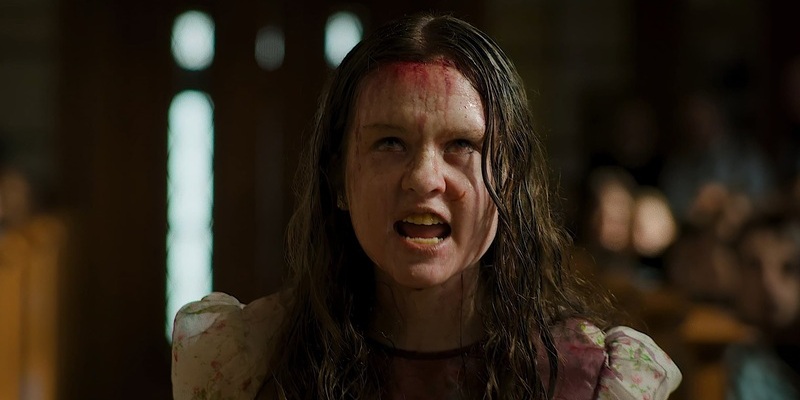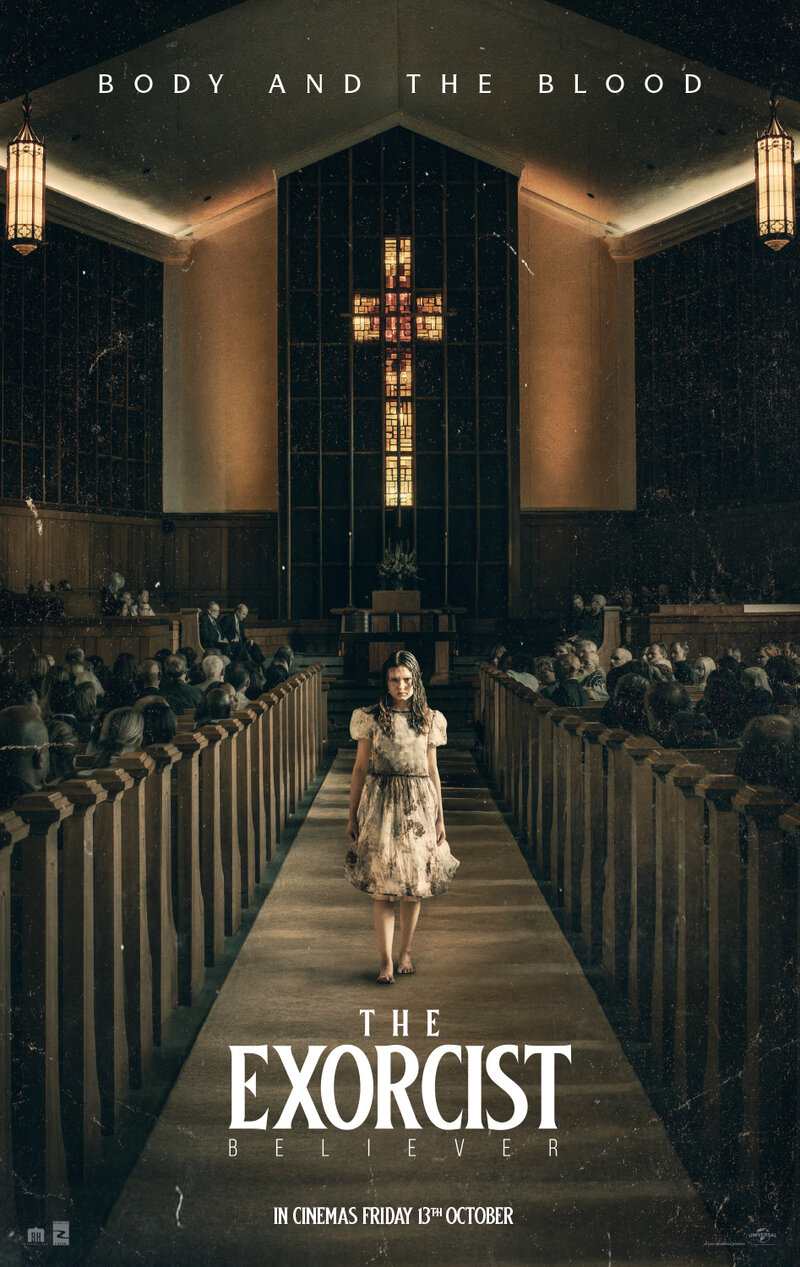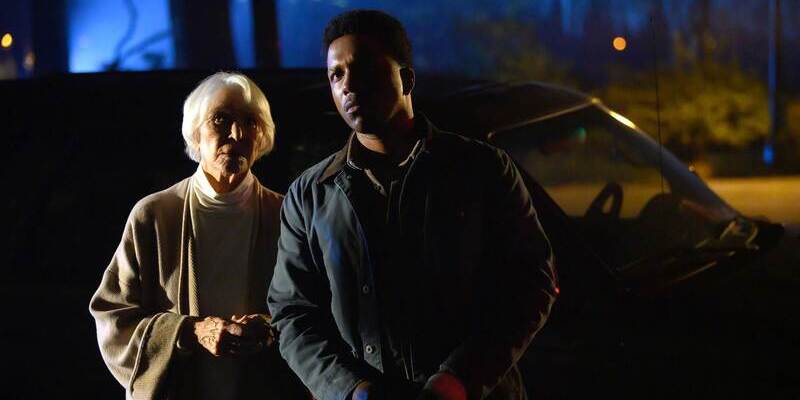
Review by
Eric Hillis
Directed by: David Gordon Green
Starring: Leslie Odom Jr, Ellen Burstyn, Lidya Jewett, Olivia
Marcum, Ann Dowd, Jennifer Nettles, Norbert Leo Butz

After making a dog's dinner of the Halloween series,
director David Gordon Green is now at the helm of a trilogy of
sequels to another 1970s horror classic – William Friedkin's
The Exorcist. Nothing about the director's filmography would suggest he's a good
fit for this, but then that was the case with Halloween, and look how that turned out. Terribly.
Well the good news is, The Exorcist: Believer isn't
terrible. It's just not a very good Exorcist movie, or a
very good horror movie in general. The only good scene in Green's three
Halloween movies had nothing to do with horror, it was a
simple scene of two of its characters awkwardly flirting, the sort of
scene Green had done very well prior to his unlikely reinvention as a
horror filmmaker. It's perhaps no surprise that
The Exorcist: Believer is at its best when it's not
dealing strictly with horror.

After a rather exploitative prologue set during the Haiti earthquake of
2010 in which photographer Victor Fielding (Leslie Odom. Jr)
loses his wife but saves his unborn child, we cut to present day Georgia
where we find Victor doing a seemingly good job of raising his now
12-year-old daughter Angela (Lidya Jewett). When Angela asks if
she can hang out with her friend Katherine (Olivia Marcum) after
school, Victor is initially reluctant but acquiesces to her request. Bad
move. The two girls fail to return home having last been spotted heading
into the woods. Unbeknownst to their parents, the girls conducted a
ritual in the hopes of contacting the spirit of Angela's mother (wait,
didn't we already see
this movie?) but unleashed something far more malevolent. When the girls are
found three days later, they've undergone a dramatic personality change,
not unlike that experienced by a certain Regan MacNeil 50 years
ago.
This first half of the movie is more of a thriller than a horror movie,
focussed on the search for the missing girls and serving as an allegory
for the current divisions in American society. Blame is passed between
the two sets of parents, and there's an underlying racial element to the
distrust Katherine's parents (Jennifer Nettles and
Norbert Leo Butz) harbour towards Victor. As an atheist in the
Bible Belt, Victor finds himself clashing with his religious neighbours
regarding the best way to deal with his situation.
But Green doesn't simply set up a lazy narrative where an educated
atheist clashes with a bunch of religious rubes. His neighbours may have
beliefs that Victor can't get on board with, at least initially, but
they genuinely have his best interests at heart. To defeat evil, they'll
ultimately be forced to put their differences aside and work together.
It's a reminder that Green is himself from the part of America
disparagingly known as "flyover country" and his best movies are set in
that part of the world and display a warmth and understanding of its
maligned people. Characters are introduced in an antagonist manner only
to later become heroic, like a neighbour played by Ann Dowd. When
we meet her first she's complaining about Victor leaving his bins out
and we immediately think of the many online clips of "Karens"
confronting African-Americans over such trivial matters. But then we
learn of the hurt she's been carrying inside her for most of her life.
Similarly, an Evangelical preacher (Raphael Sbarge) strays far
from the opportunistic caricature we expect.

This humanity is extended to the returning figure of Chris MacNeil (Ellen Burstyn). Unlike Green's ludicrous reinvention of Halloween's Laurie Strode as a gun nut, Chris's experiences have lead her to
look for the best in people. She returns to fight evil but not with a
pump action shotgun, rather with a strength of faith.
There's a reverence for the source material here that was sorely absent
from Green's take on Halloween. Gone are the comic relief characters and over the top gore, though
Green's newfound love of bathing scenes in the light from cop cars
remains. Burstyn's MacNeil feels like a natural evolution of the
character in a way Laurie Strode never did under Green's command (for
that you need to return to the under-rated Halloween: H20).
The trouble with The Exorcist: Believer is that while
there's a respect for the original film, it lacks the authenticity
devout Catholic William Peter Blatty brought to the project with his
screenplay. Having a movie about possession written by someone who
actually believed in such things gave the narrative an extra edge, and
even the most committed non-believer was sucked in as a result. It was a
movie that asked its audience to come to it, something very few
mainstream movies are allowed to do today unless they're made by
Christoper Nolan. Modern Hollywood's folly is that it's always chasing
the audience rather than guiding it. This can be seen in how this
version of The Exorcist is a considerably less Catholic
movie than the original. Chasing America's current love of faith-based
movies, the film cynically introduces a range of characters across the
Christian spectrum in the hopes of latching onto the sort of lucrative
business we recently saw performed by Sound of Freedom. The climax sees Catholics, Protestants and Evangelicals all come
together like a Christian Avengers to tackle the demon in their
respective manners (were it not for America's contempt for all things
Russian we'd probably have some Orthodox representation here too).
Another sign that the film hopes to capture a Christian audience is in
the notable lack of the sort of foul-mouthed insults hurled by Linda
Blair in the original. In stark contrast to the gore of his
Halloween movies, Green shies away from showing the
effects of Angela's first period, because if there's one thing
Christians are uncomfortable with it's the female reproductive system.
Unable to simply show a cutaway of a bloodstained bedsheet, Green has
Odom Jr. ham it up with an over-the-top reaction as he sniffs the
air.

In its home stretch, The Exorcist: Believer comes up
against the problem of trying to present an exorcism in a novel fashion.
At this point it's like trying to make a shark movie. You're never going
to do it as well as that movie from the '70s, and it's been done so many
times that it's never going to seem fresh. Linda Blair's head-spinning
antics have been parodied so often in the intervening decades that any
attempt to replicate them simply comes off as silly and hokey.
I have no idea where Green plans to take this story over the course of
the next two movies [EDIT: Green's sequels are no longer happening], but
unlike Halloween, at least it's a franchise he seems interested in working within. At
best we might get some reminders that Green was once very good at making
the sort of movies it's become increasingly difficult to get made in
America today.

